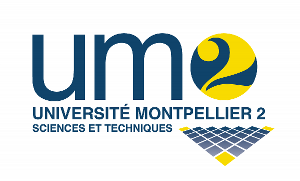
The Université du Québec à Rimouski is a public university located in Rimouski, Quebec, Canada with a campus in Lévis.

Montpellier 2 University was a French university in the académie of Montpellier. It was one of the three universities formed in 1970 from the original University of Montpellier. Its main campus neighbors the Montpellier 3 University's main campus, and for this reason the nearest tramway station is named "Universities of Sciences and Literature" rather than "University of Sciences". In January 2015, Montpellier 1 University and Montpellier 2 University merged into the Montpellier University.
The Institut national de recherche en sciences et technologies pour l'environnement et l'agriculture, formerly known as Cemagref, was a public research institute in France focusing on land management issues, such as water resources and agricultural technology. From 1 January 2020 the IRSTEA merged with the INRA to create the INRAE.
The Poney du Logone is a breed of small horse or pony from the area of the Logone River in Chad and Cameroon, in west central Africa. It is particularly associated with the Musey or Moussey people of that region, and may also be known as the Poney Musey or Poney Mousseye.
French university associations known as "pôles de recherche et d'enseignement supérieur" were a form of higher-level organization for universities and other institutions established by French law in effect from 2007 to 2013. The 2013 Law on Higher Education and Research (France) discontinued the PRES; these have been largely replaced by the new Communities of Universities and Institutions. The list below indicates the status of those institutions designated as PRES or related associations before the 2013 law took effect. See the list of public universities in France for the current status of these institutions.
The University of Lille Doctoral College, formerly the European Doctoral College Lille Nord-de-France, is part of the University of Lille since the dissolution of the Community of Universities and Institutions Lille Nord de France in 2019.

The Community of Universities and Institutions (COMUE) Lille Nord de France was a French Groups of Universities and Institutions (COMUE) spread over multiple campuses and centered in Lille. It included a European Doctoral College and federated universities, engineering schools and research centers. With more than one hundred thousand students, it was one of the largest university federations in France. The University of Lille, with nearly 70,000 students, was its main component. The COMUE stopped its activity in 2019 and its activities were transferred to its founding institutions.
Institut Agro Montpellier is a French public institution devoted to higher education and research in Agriculture, Food and Environment. Montpellier SupAgro is widely open to international issues and partnerships, with specific focus and expertise on southern and Mediterranean areas. It trains students in most of the agronomy and life sciences fields. It is part of Agropolis Fondation. The Montpellier INRA research center is also located on la Gaillarde campus. It belongs to the Institut Agro, along with Institut Agro Rennes-Angers and Institut Agro Dijon.
A Public Scientific and Technical Research Establishment is a category of public research institutes. In France, they were authorized by Law No. 82-610 of 15 July 1982. In Algeria, they were authorized by decree No. 99-256 of 16 November 1999.
An établissement public à caractère industriel et commercial is, in France, a category of public undertaking. It includes state-controlled entities of an industrial or commercial nature, including some research institutes and infrastructure operators. Some former French colonies, such as Algeria, Burkina Faso and Mauritania also use this term for such agencies.

The Institut national de la recherche agronomique was a French public research institute dedicated to agricultural science. It was founded in 1946 and is a Public Scientific and Technical Research Establishment under the joint authority of the Ministries of Research and Agriculture. From 1 January 2020 the INRA merged with the IRSTEA to create the INRAE.
An établissement public à caractère administratif is, in France, a public law legal person with a certain administrative and financial autonomy to fulfil a mission of public interest under the control of the State or a local authority.

Institut Agro Rennes-Angers is a French higher education institution, known as a grande école. Its official name is Institut supérieur des sciences agronomiques, agroalimentaires, horticoles et du paysage. It operates under the supervision of the French Ministry of Agriculture. It belongs to the Institut Agro, along with Institut agro Montpellier and Institut Agro Dijon.
Bonnie Kathleen Campbell, is professor emeritus of political economy at the Department of Political Science at the Université du Québec à Montréal (UQAM). She has written extensively on issues related to international development, development assistance, governance, and mining.

Edouard Perris full name Jean-Pierre Omer Anne Edouard Perris was a French explorer and entomologist who specialised in Coleoptera and to a lesser extent Diptera and other orders. He was Chef de division à la préfecture des Landes. Perris was a Member of Société Entomologique de France. His collection is held by École nationale supérieure agronomique de Montpellier excepting Cicindelidae, Carabini end Lebiini which are held by Museum Dax, Landes.
Henri Hitier was a French agronomist.
COUPERIN is an academic consortium in France. Formed in 1999, it includes more than 250 universities, research organizations, Grandes écoles (schools), COMUE, and others. The consortium negotiates with publishers the prices and conditions of access to scientific publications and other digital resources for the benefit of its members. It promotes open science, particularly with regard to scientific publications, both nationally and internationally. It is headquartered in Paris.
Michel Caboche , was a French biologist, director of research at Institut national de la recherche agronomique (INRA), member of the French Academy of Sciences and of the Scientific Council of the Parliamentary Office for the Assessment of Scientific and Technological Choices (OPECST).
Pl@ntNet is a citizen science project for automatic plant identification through photographs and based on machine learning.
Mohamed Sadiki is the Moroccan Minister of Agriculture, Maritime Fisheries, Rural Development, and Water and Forests. He was appointed as minister on 7 October 2021.





